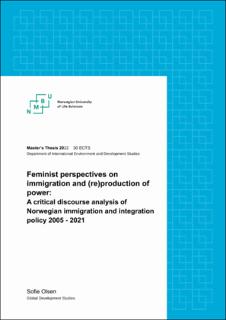| dc.description.abstract | The aim of the research for this thesis is to contribute to the understanding of how immigration and integration policy may (re)produce power structures that are causing discrimination and social inequality, particularly for female immigrants, in Norway. I pursue this aim by examining Norwegian immigration and integration policy as it has been formulated in political platforms prepared by four consecutive coalition governments from 2005 to 2021. By conducting a critical discourse analysis of immigration and integration policy, I critically reflect on how the policy contributes to (re)produce power relations based on nationality, ethnicity, class, and gender. Feminist perspectives provide me with discursive elements for analysing how power relations are produced and reproduced, and with theoretical perspectives for analysing the structural conditions that discourse influences and is influenced by. Tensions and synergies between Norwegian state feminism and decolonial feminism are particularly central. Through particular representations of ‘us’ as morally good, and of ‘them’ as problematic, an unequal power relation between ‘Norwegians’ and ‘immigrants’ is (re)produced. I argue that representations of ‘us’ are based on a myth about Norway as a homogeneous society, and as gender equal, reflecting a state feminist perspective, and that ‘the other’ are represented as a problematic opposition, and a threat to ‘our’ assumed equality. Furthermore, immigration is shown to be discursively linked to a security discourse, by the governments making immigration policy part of the “justice and emergency preparedness policy”. A representation of ‘them’ as a threat to our security can be critiqued through decolonial feminism, which has shown how imperialist and colonial representations regard ‘the others’ as a possible threat, thus (re)producing power relations based on nationality and ethnicity. Finally, by representing immigrants as a threat to the sustainability of the welfare state, ‘them’ are continued to be represented as problematic. The political platforms represent an understanding of reality wherein the welfare state and welfare schemes are vulnerable, which then used to legitimise a strict immigration policy. Thus, representations of ‘them’ as problematic, as a threat to Norwegian security and welfare, (re)produce relations of unequal dignity and power between ‘Norwegians’ and ‘immigrants’. | en_US |

